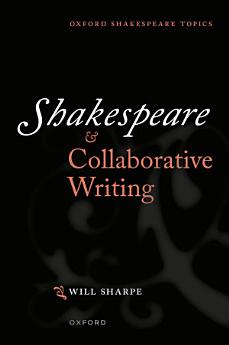Shakespeare & Collaborative Writing
Will Sharpe
ឧសភា 2023 · Oxford University Press
សៀវភៅអេឡិចត្រូនិច
256
ទំព័រ
family_home
មានសិទ្ធិ
info
reportការវាយតម្លៃ និងមតិវាយតម្លៃមិនត្រូវបានផ្ទៀងផ្ទាត់ទេ ស្វែងយល់បន្ថែម
អំពីសៀវភៅអេឡិចត្រូនិកនេះ
Shakespeare and Collaborative Writing offers a rich account of Shakespeare's artistic development in, against, and beyond collaboration. We see him afresh as a poetic innovator in continual flux, and in continual artistic debt: an author shaped by others in a collaborative network of intellectual influence and dynamic interchange, and, the book argues, one that he helped substantially to create. In considering collaboration as a practice defining almost all of his earliest works, it shows that he was particularly active in its development in the early theatre scene of his nascent career, changing our sense of his development as a creative artist quite radically. Chapters exploring collaboration via theatre history, book history, and attribution debates complement the central three chapters detailing the different phases of Shakespeare's collaborative work, which reorient our shifting sense of what it meant to him, and what he gained from it, at these other key moments of his artistic career. In reconstructing the circumstances and outcomes of his pairings with other dramatists, and scrutinizing more closely their artistic contributions, Shakespeare and Collaborative Writing reconsiders the ways in which they influenced and challenged him to adapt and experiment with his writing in ways that go beyond the features of his solo-authored canon. In undertaking a rigorous appreciation of the structures and poetics of his co-authored works, this book presents them as distinctive works of art that transform our understanding of Shakespeare the poet, dramatist, and enduring cultural icon.
អំពីអ្នកនិពន្ធ
Will Sharpe is a full-time Teaching Fellow in Shakespeare at the University of Birmingham, and has held postdoctoral fellowships at the Universities of Warwick and Leeds. He contributed a monograph-length study on 'Authorship and Attribution' to the RSC volume William Shakespeare and Others: Collaborative Plays (2013), and edited All Is True: Or, King Henry VIII for The New Oxford Shakespeare (2016). He is a revising editor of the updated Oxford Companion to Shakespeare (2015), and is editing 3 Henry VI for the Arden 4 Shakespeare Series. He is also one of the General Editors of Digital Renaissance Editions.
វាយតម្លៃសៀវភៅអេឡិចត្រូនិកនេះ
ប្រាប់យើងអំពីការយល់ឃើញរបស់អ្នក។
អានព័ត៌មាន
ទូរសព្ទឆ្លាតវៃ និងថេប្លេត
ដំឡើងកម្មវិធី Google Play Books សម្រាប់ Android និង iPad/iPhone ។ វាធ្វើសមកាលកម្មដោយស្វ័យប្រវត្តិជាមួយគណនីរបស់អ្នក និងអនុញ្ញាតឱ្យអ្នកអានពេលមានអ៊ីនធឺណិត ឬគ្មានអ៊ីនធឺណិតនៅគ្រប់ទីកន្លែង។
កុំព្យូទ័រយួរដៃ និងកុំព្យូទ័រ
អ្នកអាចស្ដាប់សៀវភៅជាសំឡេងដែលបានទិញនៅក្នុង Google Play ដោយប្រើកម្មវិធីរុករកតាមអ៊ីនធឺណិតក្នុងកុំព្យូទ័ររបស់អ្នក។
eReaders និងឧបករណ៍ផ្សេងទៀត
ដើម្បីអាននៅលើឧបករណ៍ e-ink ដូចជាឧបករណ៍អានសៀវភៅអេឡិចត្រូនិក Kobo អ្នកនឹងត្រូវទាញយកឯកសារ ហើយផ្ទេរវាទៅឧបករណ៍របស់អ្នក។ សូមអនុវត្តតាមការណែនាំលម្អិតរបស់មជ្ឈមណ្ឌលជំនួយ ដើម្បីផ្ទេរឯកសារទៅឧបករណ៍អានសៀវភៅអេឡិចត្រូនិកដែលស្គាល់។




